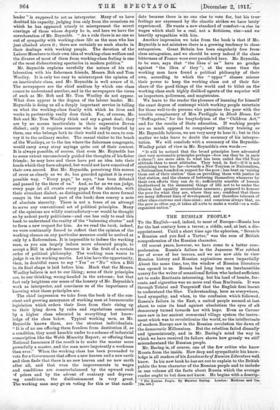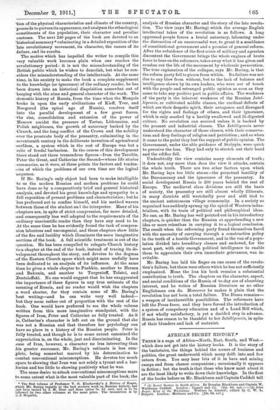THE RUSSIAN PEOPLE.* To the English—and, indeed, to most of
Europe—Russia has for the last century been a terror, a riddle, and, at last, a dis- appointment. Until a short time ago the aphorism, " Scratcir a Russian and you find a Tartar," was the sum of British comprehension of the Russian character.
Of recent years, however, we have come to a better com- prehension. Russia's failure in the Japanese War robbed her of some of her terrors, and we are now able to view- Russian history and Russian aspirations more impartially- About the same time, too, the window of Russian literature was opened to us. Russia had long been an inexhaustible- q uarry for the writer of sensationaifiction who lacked sufficient. art to make Ruritania interesting, but his land of bombs, fur- coats, and cigarettes was no more real than Ruritania. It was: through Tolstoi and Turgenieff that the English first learnt. to understand the Slay. Understanding, here as everywhere,. bred sympathy, and when, in the confusion which followed.. Russia's failure in the East, a united people seemed at last.. about to raise its bead against absolutism the eyes of all democracy turned towards her with hope. Even as Cavour once saw in her ancient communal village system the instru- ment which was to revolutionize the World, so the intellectuals. of modern Europe saw in the Russian revolution the dawn of. the democratic Millennium. But the rebellion failed dismally- and ignominiously, and in Mr. Baring's mind the way in. which we have received its failure shows how grossly we star misunderstand the Russian people.
Mr. Baring is, of course, one of the few critics who know- Russia from the inside. How deep and sympathetic his know-. ledge is all readers of his Landmarks of Russian Literature well_ know. In his new book he has set out to explain to the British- public the true character of the Russian people and to include• in one volume all the facts about Russia which the average reader ought to but does not know. He begins with a descrip- • The Russian People. By Maurice Baring. London ; Methuen and Co,..
[15e. net.1
'on of the physical characteristics and climate of the country, -proceeds to picture its appearance, and analyses the ethnological -constituents of the population, their character and peculiar customs. The next 240 pages of the book are devoted to an 'historical summary* culminating in a detailed exposition of the late revolutionary movement, its character, the causes of its /allure, and its results.
The motive which has impelled the writer to compile this -very valuable work becomes plain when one reaches the :revolutionary period : it is not the misunderstanding of the British public which be wishes to demolish, but what he con- :eiders the misunderstanding of the intellectuals. At the same -time, in his anxiety to make the book a complete supplement to the knowledge (or ignorance) of the ordinary reader, he has been drawn into an historical disquisition somewhat out of 'keeping with the aims and general character of the work. The -domestic history of Russia, from the time when the Mongols broke in upon the early civilizations of Kieff, Tver, and Novgorod (the epical age of Russia), resolves itself into the parallel development of a few great forces, the rise, consolidation and extension of the power of Moscow amidst the pressure of Tartar, Lithuanian, and -Polish neighbours, the growth of autocracy backed by the 'Church, and the long conflict of the Crown and the nobility -over the prostrate body of the peasantry, culminating in the -seventeenth century in the deliberate invention of agricultural serfdom, a system which in the rest of Europe was but a -relic of feudal barbarism. In the course of this development there stand out three tremendous figures—Ivan the Terrible, -Peter the Great, and Catherine the Second—whose life stories :summarize, as it were, at three points the factors and tenden- cies of which the problems of our own time are the logical :sequence.
If Mr. Baring's only object had been to make intelligible to us the modern Russian and modern problems he could have done so by a comparatively brief and general historical -analysis, and devoted his great knowledge and sympathy to a full exposition of present problems and characteristics ; but he "has preferred not to confine himself, and his method wavers between those of the student ant the intrepreter. Many of his
• chapters are, in spite of strict compression, far more detailed, and consequently less well adapted to the requirements of the ordinary unscientific reader than they have any need to be. At the same time he has evidently found the task of compres- .sion laborious and uncongenial, and these chapters show little of the fire and lucidity which illuminate the more imaginative sections of the book. A full scientific treatment is out of the 'question. He has been compelled to relegate Church history to a chapter at the end of the book, instead of tracing its de- velopment throughout the story, and devotes to the dogmas of the Eastern Church space which might more usefully have been dedicated to an analysis of its influence. At the same time he gives a whole chapter to Pushkin, another to Herzen and Bakunin, and another to Turgenieff, Tolstoi, and Dostoieffski. No one would suggest that he has exaggerated the importance of these figures in any true estimate of the meaning of Russia, and no reader would wish the chapters a word shorter, for they contain some of Mr. Baring's best writing—and he can write very well indeed— but they seem rather out of proportion with the rest of the book. One would have preferred to see the whole volume written from this more imaginative standpoint, with the figures of Ivan, Peter and Catherine as fully treated. As it is, Catherine's character is left out on the ground that she
was not a Russian and that therefore her psychology can have no place in a history of the Russian people. Peter is fully treated, and though he is to some extent canonized the appreciation is, on the whole, just and discriminating. In the ease of Ivan, however, a character no less interesting than his greater successor, Mr. Baring's estimate is less com- plete, being somewhat marred by his determinaticn to
:combat conventional misconceptions. He devotes too much space to showing that Ivan was not solely a tyrant and a bar- barian and too little to showing positively what he was.
The same desire to attack conventional misconceptions mars ko some extent what is the most valuable part of the book, the
• The first volume of Professor V. 0. Eluchevsky's A History of Russia, which Mr. Baring regards as the best modern work on Russian history, has just bean issued by J. M. Dent and Bons (price 7s. 6d. net), and is to be followed by two other volumes at the same price. The translation is by D. J. Howarth. analysis of Russian character and the story of the late revolu- tion. The view (says Mr. Baring) which the average English intellectual takes of the revolution is as follows. A long oppressed people forces a brutal autocracy, labouring under the distraction of an unsuccessful war, to grant it a semblance of constitutional government and a promise of general reform. After the subsidence of the first crisis of military and agrarian discontent the Government brings the whole engines of brute force to bear on the reformers, takes away what it has given and crushes out the life of the movement by wholesale persecution. The true explanation of the collapse, says Mr. Baring, is that the reform party fell to pieces from within. Its failure was not due to any blow from without, but to the lack of balance and intelligence shown by its own leaders, who were out of touch with the people and estranged public opinion as soon as they came to take any positive part in public affairs. The weakness of the party is the inherent weakness of the Russian Intel- ligenzia, or cultivated middle classes, the cardinal defects of which are their despotic spirit, their arrogance and disregard for the rights and feelings of others, and their ignorance, which is only masked by a hastily swallowed and ill-digested culture. No revolution can succeed unless it is backed by the peasant and industrial classes. The Intelligenzia never understood the character of those classes, with their conserva- tism and deep feelings of religion and patriotism ; and so when it came to the point they lost the support of public opinion. The Government, under the able guidance of Stolypin, were quick to perceive the loss. They had only to stretch out their hand and the edifice fell.
Undoubtedly the view contains many elements of truth ; it does not, any more than does the view it attacks, contain the whole truth. There are two other factors upon which Mr. Baring lays too little stress—the perpetual hostility of the Bureaucracy and the ignorance of the peasantry. In social development Russia is 200 years behind the rest of Europe. The mediaeval class divisions are still the basis of society, the peasantry are still almost wholly illiterate, in many districts still wretchedly poor and still tied to the ancient autonomous village community. In a society so organized has suddenly sprung up the spirit of Western indus- trialism, with its train of political and philosophical ideas. No one, as Mr. Baring has well pointed out in his introductory chapters, is quicker than the Russian at apprehending a new idea or more relentless in carrying it to a logical conclusion. The result when the reforming party found themselves faced with the necessity of carrying through a constructive policy in the teeth of a hostile Government, and in the van of a popu- lation divided into hereditary classes and endowed, for the most part, with only enough political intelligence to enable them to appreciate their own immediate grievances, was in- evitable.
Mr. Baring has laid his finger on one cause of the revolu- tion's failure, but there were others which he has not sufficiently emphasized. None the less his book remains a substantial contribution to truth. The chapters on the character, aspect, and social conditions of the Russia of to-day are of absorbing interest, and he writes of Russian literature as no other Englishman can do. Moreover he makes it plain that the revolution has not been a total failure. The Duma remains— a weapon of inexhaustible possibilities. The reformers have left the Press freer, and they have forced the introduction of a system of compulsory education and of a Land Bill which, if not wholly satisfactory, is yet a decided step in advance. Russia has reason to be thankful to her Intelligenzia, in spite• of their blunders and lack of restraint.



































































 Previous page
Previous page